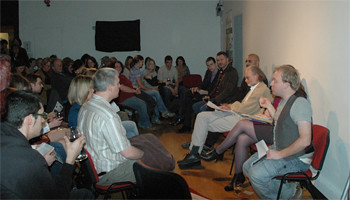The following is an essay written by Professor Joanna Latimer and relates to the Cardiff sciSCREEN event after the screening of the film Iris.
I was very interested to see this film for
two reasons. First, because it was about
a powerful woman, Iris Murdoch, who has been an important figure in my own
life, one of my heroes. Not only did she
succeed as a philosopher at Oxford, a pre-eminently man’s world, she also wrote
some extraordinary novels about the class and kind of people that I grew up
amongst in 1950/60s London: cosmopolitan intellectuals, the thinking (upper
middle) classes, ‘bo-bo’ (bohemian bourgeois) and blue stocking. Her complex, carefully observed stories
uncover how such people can be incarcerated by their egos as well as the sacred
cows of the British, middle class society that some of them, at least, are
attempting to be free of. She shows us
just how hard goodness is, the difficulties that a specific time and place in
history make for being not just true to self, but also to a sense of a greater
good. Whilst Iris Murdoch is associated
with the libratory movement of the ‘60s, she is very cautious of how a
revolution in attitudes and mores can be attained to the good, and she preserves a sense of the importance of duty,
and a particular kind of moral freedom, which is not centered on the self but
on relations. Most of all, then, Iris
Murdoch was for me brave – not just because she represented the special
relation between language and the mind, a relation that enables truth and
freedom, but because she was so direct and true in her pursuit of goodness: at
a time when all around were advocating a bonfire of institutions she was
thinking through their worth, and how we need institutions, such as duty, to be
able to be good even when we are at a loss, incarcerated by our own false gods,
such as the need to keep up appearances.
I loved her wit but also the grace that comes from a passion for finding
truth, rather than mere correctness[1],
a grace that shone from her eyes.
Secondly, I wanted to see Iris, because I have an academic
interest in dementia. I am interested in
understanding the affects and effects dementia has. Here rather than just thinking of dementia in
terms of a diseased brain, I see dementia in terms of how it disorders
identities and relations. In particular
how it disorders the complex social processes that produce the appearance at
least of cooperation, what sociologists such as Erving Goffman and Harold
Garfinkel observe as a person’s capacity to fit in, get along and ‘do’ member. Thus I am also interested in offering a
complementary discourse to the medical and policy discourse of waging a war on
dementia. I want to help find a way of
understanding dementia and explore how dementia, in its many different forms,
is disordering of more than cognition.
Dementia disorders forms of social organization, and challenges deeply held
cultural preoccupations with particular forms of identity, especially the
relation between personhood and the capacity to be social - fit in, conform,
know how to get along. Dementia makes difference visible. So I am interested in finding ways to ‘dwell’
with dementia’s forms of difference.
The film represented what it is like to
live with dementia, but not from inside dementia, from outside it. By
giving us the perspective of the person who ended up as the ‘carer’ – John
Bayley - it was a poignant portrayal of what it is like for others who are
close, even dependent, to live alongside and attempt to cope with the degeneration,
and seeming loss, of their loved one.
And I think on this score the film will have spoken to many who have
been in similar predicaments.
Through the use of flashback, we are also able
to see how the marriage between John Bayley and Iris Murdoch was rooted in Iris’
strength. We are shown just how
dependent John Bayley is on Iris – she animates his life, from the very
beginning: she, in Johnny Cash’s words, ‘carries’ him. He is portrayed as a repressed, stuttering,
absent-minded and very sweet young man, one who is good at making him self a
figure of fun. And we see how he is
carried along, sometimes in ways he cannot understand, or even at moments
participate in (I am thinking here of the scene where he watches Iris with
another man through the crack in the door, or when he is standing below her
window and sees here embracing and kissing a woman). Not only is their relationship portrayed as
highly intellectual and eccentric, but also as contributing to an experimental
and liberating force in British history. The flashbacks to scenes of them
riding their bikes at speed, of swimming naked in the river, and of Iris'
commitment to the politics of sexual freedom, all help convey the entanglement
of their relationship in the liberating politics of post war England that
challenged what had gone before. Crucially,
we are shown how Iris leads here, pulling John along with her: he is always
behind, riding in her slipstream. We also learn that it is Iris who is central
to the, albeit rather minimal, order in their lives.
We see how the dementia gradually excludes
Iris, and therefore John, from the intimacy of a life lived in the relationship
between the mind, language and a particular kind of freedom. Here, the metaphor
that underpins the film is one of being gradually excluded from the clear light
that comes from the relation of language and mind, the relation at the heart of
Iris’ world.
The film shows how Bayley and Murdoch begin
by trying to give dementia room. On the
one hand as leading academics and intellectuals they attempt to contribute to
knowledge and understanding, and participate in the clinical work of studying
dementia, including the new technologies that enable the representation of the
diseased brain. On the other, portrayed
as deeply eccentric, they seem perfectly suited to adapting to dementia's
disordering power. But because it is words, not as mere referents, but as
metonymic for worlds of ideas, the stuff of Iris' life, that are most affected,
they find that as the disease progresses, any room for them, for a free life
inside language and thought, becomes obliterated. We see dementia's disordering
power here vividly represented not just by Iris’ retreat from writing, her
writer’s block, or her blankness and anxiety, but by the increasing disorganization
of the household: as her mind deteriorates their is literally less and less
space for thinking and living as the clutter and the filth gradually take over.
As the scanning machines and the doctors
abandon all hope, predicting that the lights are going out, Bayley tries to
find his (and the world’s) Iris again, convinced that she is there
somewhere. He encourages her with paper
and pen, and tries to get her to retrieve her former self by writing, and
discoursing. But we see scenes in which a very different person is
becoming present – one who watches Teletubbies, and pees on the carpet, one who
repeats things and makes no sense any more, one who escapes and gets lost, on
the streets of Oxford, and found, in a supermarket by an old flame. She is not just in a state of disorder but is
disordering, and as Derrida put it, ‘elsewhere’. She is no longer competent in her and John’s
former world, and Bayley becomes less and less competent in hers – to the point
of exasperation and abusiveness: ‘I hate every bit of you’ he screams at her in
bed. She turns over to him and utters
the truth, with her old directness, ‘I love you.’
The scene at the seaside for me is a
profound one. After the greetings, in
which Iris does not seem to make any sense of who anyone is, we see her running
down the shingle to the sea, childlike, clutching her rather tatty notebook in
her hand. We then see Iris sitting on
the shingle, tearing pages from her reporter’s pad, laying them out carefully
in rows, and placing her beloved stones on them, beautifully, and in perfect
symmetry. She is creating a new kind of
writing, a new kind of ordering, perhaps even a new kind of book. But what happens next reveals the profound
distance between her reality and that of the world she once helped create. At
this critical moment on the beach, the old order intrudes with Janet and John,
who walk down to her and ask her to sign her ‘real’ book, her last novel,
holding out the page of the book to be signed together with a biro pen. Iris can't (or wont?) do it, she refuses, she
is like someone for whom the world that the book, and the signing of it, no
longer mean anything. Janet and John
don’t see the sense in her new pebble book, and Iris destroys it, freeing the
blank pages from the weight of the rounded stones, so that they are caught by
the wind and taken out towards the sea.
Eventually, then, dementia becomes an
adversary for John, one that obliterates the Iris he once had, and it seems not
to give their old ways of being together any room. But nor does that old
world, those old forms of ordering, have room for the new Iris. And we see her taken to a home, reasonably
happily, a space that seems to have room for her. We see Iris dancing and singing alone, along
a corridor, with huge windows down one side, filled with billowing, translucent
curtains. The corridor and Iris seem
light and mysterious and calm, yet quietly joyous. In the home, then, she seems to have regained
the light, before she dies there, as John says, peacefully.
Finding ways to make room for dementia, and
the reality and personhood of the one with dementia is hard, because it
disorders the very foundations of our living together in the world: it can
undermine a person’s capacity to be social, conform (more or less!), negotiate,
or even resist, but intelligently, accountably, with reason. Perhaps we can think then how dwelling with
dementia is about seeing the sense in the reality and world of the person with
dementia, becoming more competent in that world and letting the person who they
once were, ‘go’, at the same time as letting the person they are becoming dwell
with us, cherishing their difference.







No comments:
Post a Comment